With all this in mind, if you find it really difficult to be present, there’s a good chance that it’s because you’re stressed out, consumed with worry or are constantly being pulled out of the present moment from all the stimulating bells and whistles around you (like phone notifications or the TV above your friend’s head at the bar).
How To Be More Present
If you want to be more present, Dr. Wolf says something that will majorly help is to stop trying to multitask. “Multitasking is a big opponent of being present because it often means we are a little present for a lot of things, but not really present for any of them,” she says. In fact, it’s actually impossible to focus on two tasks at the same time. Instead, the brain rapidly switches between the two tasks. (The exception to this is when one of the activities is something you can do without even thinking about it, like unloading the dishwasher while listening to a podcast.)
Quitting multitasking allows you to be fully present in whatever it is you want to have your mind on. If you want to be more present, try doing only one thing at a time. For example, not texting when someone is talking to you or not scrolling social media while you’re watching TV.
If you think this sounds a whole lot like mindfulness, that’s exactly what it is. All three experts say that mindfulness is simply being aware of the present moment. In other words, being mindful and being present are the same thing. It’s a misconception that mindfulness is synonymous with meditation. While mindfulness can be part of meditation, Sugar explains that being mindful is using your senses to take in the moment. For example, if you’re eating, it means focusing on how your meal looks, smells, tastes and feels as you eat it.
Both Sugar and Dr. Wolf say that the reason why doing mindful meditations regularly can help with being more present is because it’s a way to focus on the breath, which can come in handy whenever you notice yourself spiraling and want to connect more to the present moment. Sugar explains that when you find yourself distracted or anxious, focusing on your breath is a way to center yourself. He adds that taking slow belly breaths is also a way to take the body out of fight-or-flight mode, aka the kryptonite of being present.
Here’s the thing about being present: The more you remind yourself to do it, the easier it becomes. “The moment you notice you not being present, you are present! The hardest thing is to realize that you are not present,” Dr. Wolf says. In these moments, she recommends pausing, taking a deep breath, observing what’s happening, and proceeding in the present moment. If other thoughts (like worries) start distracting you, she says to simply recognize the thought, but not to dwell on it.
Can’t stop worrying? It’s likely time to enlist the help of a therapist. There are lots of ways to go about this, but if anxiety, depression or a traumatic past experience you haven’t dealt with keeps getting in the way of you enjoying the present, seeing a cognitive behavioral therapist can help with developing strategies that work for you.
You may not want to be fully present for every single moment, and that’s totally fine. But knowing how to be more present will help you fully enjoy the moments you do want to remember. After all, it’s your life—you should be there for it.

